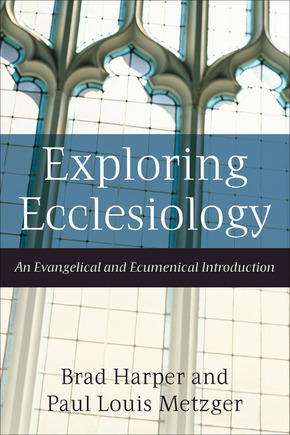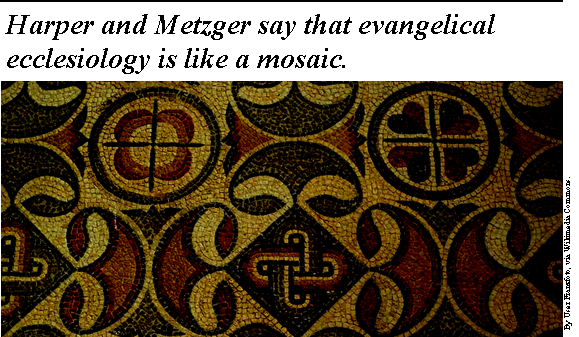| February 24, 2011 |
no comments
 Brad Harper and Paul Louis Metzger, Exploring Ecclesiology: An Evangelical and Ecumenical Introduction (Grand Rapids: Brazos, 2009), 336 pages, ISBN 9781587431739.
Brad Harper and Paul Louis Metzger, Exploring Ecclesiology: An Evangelical and Ecumenical Introduction (Grand Rapids: Brazos, 2009), 336 pages, ISBN 9781587431739.
Exploring Ecclesiology promises “an evangelical and ecumenical introduction” to the doctrine of the church. This subtitle to the otherwise aptly entitled book is multi-faceted and, judging from the nature of the book, intentionally so. On the one hand, the book is an introduction for evangelicals to the discipline of ecclesiology and the ecumenical discussions on the nature and purpose of the church. On the other hand, the book is an introduction for non-evangelicals to the problems and concerns of the church as they are perceived and discussed in the evangelical community. The authors define their use of “evangelical” with reference “to that post-World War II movement in Protestant American Christianity that prized the ‘fundamentals of the faith’” (p. 13). With that in mind, the combination of “evangelical” and “ecclesiology” is a welcome contribution to the growing debate about ecumenical ecclesiology.
The church is a trinitarian, eschatological, worshipping, sacramental, serving, ordered, cultural, and missional community.
The layout of the book, at first glance, is reminiscent of Avery Dulles’ classic
Models of the Church. Writing from an evangelical perspective, Harper and Metzger seem to portray eight “models” of understanding the nature and purpose of the Christian community, each in a separate chapter: the church as trinitarian community, eschatological community, worshipping community, sacramental community, serving community, ordered community, cultural community, and missional community. However, this is precisely where the book differs from Dulles’ work in two significant areas: First, the trinitarian and eschatological chapters form the theoretical underpinnings for the rest of the book. With that intention, the book ceases its model function. The foundational considerations of the triune God and the eternal Kingdom shape the remaining discussion of various themes that are mostly practical in orientation. Second, these eight chapters are interspersed with eight additional chapters that extend the thought of their counterpart and carry it into discussions of culture, fleshing out the cultural significance of the theological concepts. The result are 16 chapters alternating between theological and cultural considerations of the church. This layout reveals the substantive argument that underlying all ecclesiological proposals must be the idea that the church exists only in concrete cultural settings. In light of the author’s definition of “evangelical,” these discussions are dominated by American cultural concerns. Furthermore, in light of the continuing transitions of cultural settings, there cannot emerge from this book a “once-and-for-all” proposal on the doctrine of the church.
 The history of evangelicalism in America shapes the ecclesiological perspective of the authors. Emerging from the modernist-fundamentalist controversy of the early twentieth century, and shaped by the development of fundamentalism after World War II, evangelical ecclesiology exhibits a considerable diversity. While this diversity makes it difficult to speak of an evangelical ecclesiology, in a doctrinal sense, the authors lament the neglect of ecclesiology among evangelicals and reject the common perception that evangelicals have no ecclesiology at all. Instead, Harper and Metzger intend to make this diversity their advantage and propose that the image of a mosaic is perhaps the best metaphor for ecclesiology from a contemporary evangelical perspective.
The history of evangelicalism in America shapes the ecclesiological perspective of the authors. Emerging from the modernist-fundamentalist controversy of the early twentieth century, and shaped by the development of fundamentalism after World War II, evangelical ecclesiology exhibits a considerable diversity. While this diversity makes it difficult to speak of an evangelical ecclesiology, in a doctrinal sense, the authors lament the neglect of ecclesiology among evangelicals and reject the common perception that evangelicals have no ecclesiology at all. Instead, Harper and Metzger intend to make this diversity their advantage and propose that the image of a mosaic is perhaps the best metaphor for ecclesiology from a contemporary evangelical perspective.
The church is someplace: The idea that the church exists only in concrete cultural settings must underlie all ecclesiological proposals.
The book’s emphasis on culture is significant, since it promises an ecclesiology that is concrete, relevant, and critical. When it comes to the once-and-for-all elements that the church possesses, despite the authors’ hesitation, Harper and Metzger offer a valuable ecclesiological discussion that does not shy away from concerns about American individualism, ecology, enculturation, race and class barriers, church discipline, or the role of women. These discussions are absent from many classics and standard works of ecclesiology. The combination of church and culture is a precarious one because it touches the Christian community at its core, questioning the authenticity of its doctrines and practices in light of the demands and needs of particular cultural contexts. Theological texts have discussed these challenges since the 1970s under the headings “contextualization” and “inculturation.” Surprisingly, however, the nature of the church is rarely the subject of such debates. On the contrary, church and culture are often seen as two distinct realms, and it is their association and integration that remains the chief problem. Ecclesiology is the subject but not the object of consideration. Culture, in turn, is often seen as ambiguous and in need of redemption or, at least, purification. In this view, culture is not part of the church—it is part of the mission of the church. In contrast,
Exploring Ecclesiology integrates the various dimensions of culture into the quest for an evangelical ecclesiology. This approach allows for, often necessary, critical assessments of the ecclesial landscape in American evangelicalism and beyond. From that perspective, the book opens up an important direction and blazes a path for the future of evangelical ecclesiology.
Tags: ecclesiology, exploring
Category: In Depth, Winter 2011
 Brad Harper and Paul Louis Metzger, Exploring Ecclesiology: An Evangelical and Ecumenical Introduction (Grand Rapids: Brazos, 2009), 336 pages, ISBN 9781587431739.
Brad Harper and Paul Louis Metzger, Exploring Ecclesiology: An Evangelical and Ecumenical Introduction (Grand Rapids: Brazos, 2009), 336 pages, ISBN 9781587431739. The history of evangelicalism in America shapes the ecclesiological perspective of the authors. Emerging from the modernist-fundamentalist controversy of the early twentieth century, and shaped by the development of fundamentalism after World War II, evangelical ecclesiology exhibits a considerable diversity. While this diversity makes it difficult to speak of an evangelical ecclesiology, in a doctrinal sense, the authors lament the neglect of ecclesiology among evangelicals and reject the common perception that evangelicals have no ecclesiology at all. Instead, Harper and Metzger intend to make this diversity their advantage and propose that the image of a mosaic is perhaps the best metaphor for ecclesiology from a contemporary evangelical perspective.
The history of evangelicalism in America shapes the ecclesiological perspective of the authors. Emerging from the modernist-fundamentalist controversy of the early twentieth century, and shaped by the development of fundamentalism after World War II, evangelical ecclesiology exhibits a considerable diversity. While this diversity makes it difficult to speak of an evangelical ecclesiology, in a doctrinal sense, the authors lament the neglect of ecclesiology among evangelicals and reject the common perception that evangelicals have no ecclesiology at all. Instead, Harper and Metzger intend to make this diversity their advantage and propose that the image of a mosaic is perhaps the best metaphor for ecclesiology from a contemporary evangelical perspective.

